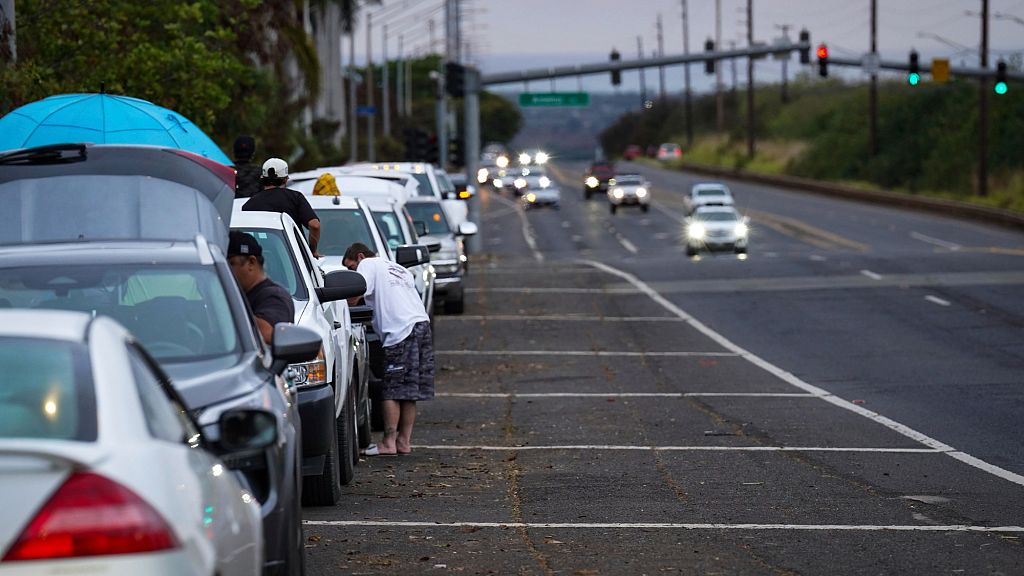A powerful 8.8-magnitude earthquake off the east coast of Russia on Wednesday morning triggered tsunami waves that reached Japan and Hawaii and the US coast.
It is one of the strongest earthquakes recorded in modern history.
Japan ordered nearly 2 million people to evacuate. Initial tsunami warnings have now all been downgraded to advisories or forecasts.
Related
Tsunami alerts of varying levels were also issued across many Pacific islands, parts of China, Indonesia, New Zealand, Peru, Mexico and the Galapagos Islands off Ecuador. Most of these have also been downgraded or cancelled.
The Klyuchevskoy volcano, one of several on Russia’s far eastern Kamchatka Peninsula, has also started erupting, according to the state news agency RIA.
Travellers urged to heed local authority evacuation orders
The UK Foreign Office has updated its travel advice for 15 countries. Travellers are being warned to follow the advice of local authorities and watch for updates if they are in a place where an alert has been issued.
Tsunami waves reached Hawaii, with a 1.2 metre swell recorded off Oahu. A 1.74 metre was recorded at Kahului, Maui, while one of 1.5 metres was recorded in Hilo.
Hawaii Governor Josh Green has asked people to follow evacuation orders and stay calm.
The tsunami warning has since been downgraded, and evacuees have been permitted to return home.
A 1.3 metre wave reached Japan’s northern Iwate prefecture, according to the country’s weather agency, with others showing up in the Fukushima and Miyagi prefectures.
The tsunami has also hit the coast of California, according to the US National Weather Service.
In Indonesia, residents and tourists in Papua, North Sulawesi, North Maluku and Gorontalo have been advised not to approach coastal areas.
Tsunami alert complicates travel in Japan
Ferries connecting Hokkaido and Aomori on the northern tip of Japan’s Honshu island were suspended, as well as those connecting Tokyo and nearby islands.
Some local train operations have been suspended or delayed as well, according to operators.
Sendai airport says its runway has been temporarily closed with two domestic flights, one from Fukuoka and another from Osaka, diverted to other airports.
Japan Airlines and All Nippon Airways have cancelled all flights to Sendai airport.
Hundreds of delays have been recorded at other Japanese airports including Narita International, Tokyo International (Haneda), Kansai International and Fukuoka.
Flights diverted away from Hawaii
Several flights were diverted away from Hawaii following tsunami warnings, according to FlightRadar24. That includes some that had already departed from Los Angeles, Vancouver, San Francisco, and San Diego.
Honolulu Airport is not closed but is advising travellers to check directly with their airline for the most up-to-date flight status and travel advisories.
Flights are gradually returning to normal following the downgrading of the tsunami warning.
Some arrivals scheduled for this afternoon have been cancelled, though, including an American Airlines flight from Dallas-Fort Worth, United Airlines from San Francisco, and Delta Air Lines from Seattle and Los Angeles.
Cancelled departures this afternoon include a Delta Air Lines flight to Minneapolis, American Airlines to Dallas-Fort Worth, and United Airlines to Houston and Denver.
Alaska Airlines and Hawaiian Airlines have suspended services to, from or within the Hawaiian islands. As a safety precaution, Alaska Airlines said that flights en route to Hawaii are returning to the mainland or diverting as needed.
“Guests with travel to, from or within the Hawaiian Islands should check the status of their flight before heading to the airport. We are monitoring airport conditions with government agencies and could see operational impacts,” the airline said in a statement.
It added that a waiver is in place to allow passengers flexibility to adjust their travel plans.
Cruise ships in Hawaii forced to depart ahead of schedule
The US Coast Guard has ordered all commercial vessels to evacuate Hawaiian ports, with all harbours closed to incoming traffic.
Norwegian Cruise Line’s Pride of America ship has been forced to depart from Hilo harbour in Hawaii around two and a half hours ahead of schedule.
Passengers received alerts reading, “Due to a tsunami warning issued by the State of Hawaii, Pride of America will be departing Hilo immediately as directed by the Department of Transportation.”
“If you’re not in the vicinity of the port, seek higher ground and follow the direction of the local authorities for your safety.”
Many passengers who were out on excursions, as well as crew, were not able to get back to the ship before it left the port, leaving them stranded.
Oceania Cruises’ Oceania Regatta also reportedly executed an early departure Kailua-Kona port, according to the website Cruise Hive.
A ship in deeper waters will barely notice a tsunami travelling below it, and so it is standard procedure for vessels to head away from the port when a tsunami is likely to hit.
What are my traveller rights to compensation in the event of a natural disaster?
Travellers who are affected by the earthquake and tsunami warnings should check their travel insurance policy documents to see if they are eligible for compensation.
“Travel insurance policies that include natural disaster cover will generally cover you for cancelled accommodation, travel and activities, as well as emergency medical care and evacuation should you need it,” says travel insurance expert Alicia Hempsted from MoneySuperMarket.
However, under international regulations, airlines are not required to compensate you for delayed or cancelled flights in ‘extraordinary circumstances’, which include natural disasters, such as earthquakes or tsunamis.
“If your flight, however, is delayed because of this, your airline has an obligation to offer food, drink and accommodation depending on the length of your delay,” Hempsted says.
“If extreme conditions are forecasted before you book or leave for your trip, and you choose to travel regardless, your insurance provider may not cover you for any related problems.”


AloJapan.com